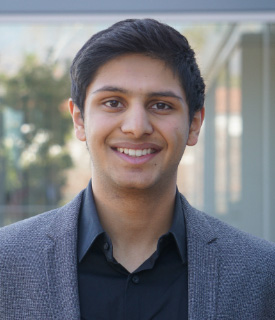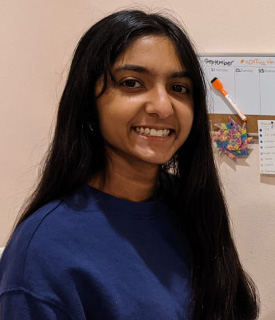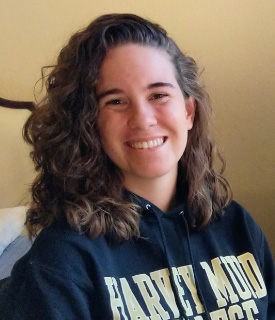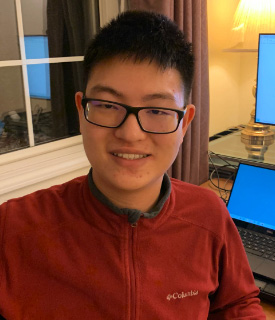Leadership Training for All
The College recognizes that all HMC students are potential leaders. So, a new program that allows more students to fit leadership training into their schedules has been developed and is now in its second year.
Administered by the Division of Student Affairs, Impact Leadership is a cohort-based, skill-building leadership development program focused on values—individual, group and societal—while emphasizing identity development, equity and inclusion. Students have access to 24 skill-building workshops and can participate as their schedules allow. Those who complete eight sessions in one of the three modules receive extra benefits, like coaching and access to leadership events.
“Students have really enjoyed the process of first learning to lead themselves, followed by competencies that help them lead others and then finally learning about how to lead with the bigger picture and values of community and society in mind,” says Leslie Hughes, assistant vice president for student affairs and program coordinator.
Impact Leadership participants past and present describe their experiences in this program, which is based on HMC’s mission statement: “… assume leadership in their fields with a clear understanding of the impact of their work on society.”
Sidhant Rastogi ’23, 2019 cohort; 2020 HMC Outstanding Emerging Leader; Homework Hotline, Wellness Peers, CAP
 Why did you join the Impact Leadership program?
Why did you join the Impact Leadership program?
“One of the reasons I chose to go to Mudd was their strong emphasis on societal impact. I’m a firm believer that equally as important as what you do is why you do it. When I learned about the program, I thought it was a great way to focus on this aspect of my education.”
How has Impact Leadership complimented your Mudd education?
“I think the Impact Leadership program really complements Mudd’s rigorous academics by reinforcing its focus on developing students holistically. The great thing about Mudd is that from day one, we’re taught that academics aren’t everything and that learning the softer skills in life is equally as important to position ourselves as future leaders. As students, the unfortunate reality is that we too often get lost in an abyss of problem sets and papers, losing sight of why we’re doing what we do in the first place. Programs like Impact Leadership are a great reminder that learning how to be a leader is an essential part of our education, not an ancillary goal.”
Impact Leadership has an emphasis on identity development, equity and inclusion. How do you think this will help you as a future leader in STEM?
“I think it just makes sense. The beauty of STEM is that the tools we learn in our math and science classes can be used to solve real-world problems. But it’s not just about what we can do with these tools that matters, it’s equally important to consider what we should do, and what consequences our actions will have. Different people have different strengths and perspectives that they bring to the table. As a leader, understanding others and ourselves allows one to obtain a global perspective of the true impact of their decisions.”
How has Impact Leadership helped you learn about yourself and your leadership style?
“I think the most helpful aspect of the program was getting to work with a cohort of around a dozen other students who were just as interested in developing leadership skills. Working with them week after week helped me build friendships and learn from my peers in a uniquely non-academic setting. Understanding how to work with different personalities was really helpful for me because I typically like to be really vocal leader, but I learned that sometimes it’s best to change up my style in order to help the group be more successful.”
What great leader do you admire and why?
“To be honest, I don’t have one person in mind, for a few reasons. I think that, as a society, our perception of ‘leadership’ as a whole is skewed. A great leader doesn’t necessarily have to be a bigshot CEO or politician. Every day, there are millions of people who make a positive difference in the lives of people around them, yet aren’t necessarily recognized for it. To me, those people are just as important as anyone you hear about in the news. The other thing is that greatness is very relative – a great leader in one person’s eyes may be terrible in another’s. And no one is without their flaws, not even some of the ‘greatest’ leaders in society today. What I’ve learned through programs like Impact Leadership is that anyone who wants to make a difference and takes initiative can be a great leader.”
Ingrid Tsang ’22, 2019 cohort; 2020 HMC Outstanding Emerging Leader; ASHMC sustainability director
 Why did you join the Impact Leadership program?
Why did you join the Impact Leadership program?
“I had never previously taken a course in leadership, and most of my knowledge on being a leader came from personal experience and reflection, as well as talking (informally) with my peers and mentors. Therefore, I thought that the Impact Leadership program would be a great opportunity to learn about leadership in a more structured setting, and to hone in on some of the key areas of being a good leader, so that I can better apply these skills to make a bigger impact on the groups I work with and causes I work on.”
How has Impact Leadership complimented your Mudd education?
“I think that being part of the program has allowed me to take a step back to see the bigger picture, as I have been able to more thoughtfully consider the connections between what I’m learning in the classroom and how that can connect with the real world. While we often discuss real-world applications and issues in our classes, these discussions often feel very broad and far-off, so this program was helpful in serving as a bridge between our STEM education and the real world. For example, one of the first sessions I attended was about values and purpose. This was among the most impactful sessions for me because it helped me think about how I can use my skills and knowledge, both within and outside of STEM, to contribute to issues I value most and align my actions with my values. This is so important to think about as a leader because it builds the foundation behind my ‘why’ and forms my guiding principles as a leader.”
Impact Leadership has an emphasis on identity development, equity and inclusion. How do you think this will help you as a future leader in STEM?
“One of my biggest takeaways from the program is the importance of finding the intersection between work that is personally fulfilling and also has a positive impact on society, because this is where we will be motivated to do our best and can sustain for the long run. Participating in this program made me think more deeply about where this intersection is for me and how I can apply my skills and knowledge to these areas both now and in the future. This program also impacted upon me the importance of leaders working with the community to foster a culture of inclusion and belonging. The sessions highlighted the importance of being intentional with this process, understanding that these are not checkboxes to be ticked, but rather reflected in our daily interactions. These are lessons I will undoubtedly take into my work both as a leader and a member of the community.”
How has Impact Leadership helped you learn about yourself and your leadership style?
“As I mentioned, this program has helped me think more deeply about the values that are important to me, and in what ways I can apply my skills and knowledge to areas that are both personally fulfilling and make a positive social impact. While I still don’t have a good idea of what my work will look like in the future, it was very helpful to hone in on what is important to me and use that as a starting point. This is also something I try to emphasize working with the ASHMC sustainability reps— finding those intersections where we can make the most impact while also enjoying what we do, especially since working on climate and other environmental issues can often be very depressing and frustrating.
“One of the things I’ve learned about my leadership style is that it is really important for me to give the team autonomy to make decisions and work on areas they feel most passionate about, which also gives a greater sense of ownership, accountability and accomplishment throughout the process, while also checking in with them regularly and being there to support them whenever they need help. This is something I’ve been working very hard to implement with my ASHMC co-sustainability director, as we continue to iterate and improve through reflection, discussion and feedback from our team.”
What great leader do you admire and why?
“One of the leaders I admire the most is Sir Alex Ferguson, the manager of Manchester United between 1986 and 2013. He was a highly empathetic leader, who was always willing to lend an ear and a helping hand to anyone in the team. He communicated very well with all the players, such as always explaining privately to the players the reasons behind his decisions, which was especially important given that it is by nature of a soccer team that not all players can play as much as they would like. At the same time, he maintained extremely high standards for everyone on the team and kept everyone accountable for their actions. Moreover, he knew the names of all the staff at the club, including the cooks, receptionists and laundry staff, and treated them with great respect. He would always highlight the important role every member of the club played in the team’s successes, and he would bring them in on the team’s celebrations.”
Tanvi Krishnan ’24, current cohort
 Why did you join the Impact Leadership program?
Why did you join the Impact Leadership program?
“I joined the Impact Leadership program because I know that leadership is an extremely valuable skill, and this program seemed like a great way to learn and develop this skill.”
How has Impact Leadership complimented your Mudd education?
“This program helps me learn how to apply the knowledge I learn in classes in an effective way to create change.”
Impact Leadership has an emphasis on identity development, equity and inclusion. How do you think this will help you as a future leader in STEM?
“I think this will help me better understand how to promote diversity and inclusion as a leader by learning to identify and utilize everyone’s talents in an effective way. “
How has Impact Leadership helped you learn about yourself and your leadership style?
“The program has helped me explore my own strengths and weaknesses, which helps me better understand my role as a leader.”
What great leader do you admire and why?
“I admire Ruth Nader Ginsburg because she was an amazing woman who spent her life fighting for her ideals and fostering great social change.”
Skylar Gering ’22, 2019 cohort; 2019 HMC Outstanding Emerging Leader
 Why did you join the Impact Leadership program?
Why did you join the Impact Leadership program?
“I joined the impact leadership program because I wanted formal training in leadership skills. In my first year at Mudd I was in student government as Mudd’s sustainability director, a position I continued in my sophomore year. I definitely learned a lot about leadership from this position. It was very hands-on learning, and I loved the experience. However, I wanted an opportunity to learn more about the tenets of leadership and have the ability to discuss and practice new skills with my peers.”
How has Impact Leadership complimented your Mudd education?
Mudd is an incredibly collaborative place. No matter what you are working on, you are usually doing it with others. Thus, it has been incredibly helpful to understand different leadership styles and appreciate what different people bring to a team. Impact leadership also provided a space where I got to delve into deep questions about my values and identity. With a busy Mudd schedule, it is sometimes hard to find the time to consider these questions, so I enjoyed having an hour carved out of my week to pursue them with like-minded peers.”
Impact Leadership has an emphasis on identity development, equity and inclusion. How do you think this will help you as a future leader in STEM?
“Being a leader in STEM doesn’t only mean being great at science, it also means that you have to be excellent at communicating your ideas. Impact leadership helped me identify how to communicate with people with different ideas and values. Additionally, leaders have the duty to make their workplaces more diverse and welcoming to everyone. Diverse science is strong science. Impact leadership gave me the skills and training to stand up for myself and others, to have confidence in my own internal values and to pursue my vision of leadership.”
How has Impact Leadership helped you learn about yourself and your leadership style?
“Impact leadership really helped me to examine my goals and core values. Using the knowledge I gained, I was better able to direct my future career goals. For me, environmentalism and protecting the planet are incredibly important and, ever since participating in impact leadership, I have focused my future aspirations around that knowledge. I also learned that I am a skilled communicator and I enjoy finding individual team members’ strengths and building plans around those strengths. I find joy in helping people find their greatest potential within a project so that we can all succeed together.”
What great leader do you admire and why?
“I actually discovered a new one recently! The week after finals, I virtually attended the American Geophysical Union (AGU) conference. I am thinking of going to graduate school in atmospheric or ecological modeling, so I wanted to watch some of the talks to get a better understanding of what type of research was being done. The first talk was given by Leland Melvin, a NASA astronaut and engineer with an incredible life story. The takeaway message of the talk was to find someone to support you in your journey and to support others. He emphasized the importance of diversity in STEM, and that the scientific community needs to come together to protect the planet. I was so impressed with Mr. Melvin’s ability to unite the AGU community towards one common goal. His passion was palpable and exactly what I needed to hear at the tail end of 2020. Something that I really appreciate about the Impact Leadership program is the ability to recognize good leaders and leadership skills in my everyday life. I am able to recognize these skills and note to myself what individual traits and choices inspire me and then integrate those into my own leadership style. I attribute some of this to the awareness I gained during the impact leadership course.”
Eric Chen ’24, current cohort
 Why did you join the Impact Leadership program?
Why did you join the Impact Leadership program?
“I love meeting new people, and I think Impact Leadership is a great program to get to know some awesome and productive people all the while developing better leadership skills. I was also interested in the specific skills that will be discussed in the program, such as developing resilience and delegating tasks.”
How has Impact Leadership complimented your Mudd education?
“In Mudd’s ‘classrooms,’ I gained a lot of knowledge about science and technology as well as opportunities to collaborate and learn about relevant real-world issues. I think Impact Leadership develops the soft skills that will help me make the most of those opportunities. For example, being conscious of how much everyone is participating in a conversation is helpful in breakout rooms and working on problem sets. Collaboration is more effective and productive when everyone is following along and contributing. And I think Impact Leadership gave me the skills to actively listen to, lead and follow others to be the most productive.”
Impact Leadership has an emphasis on identity development, equity and inclusion. How do you think this will help you as a future leader in STEM?
“In my opinion, it is the leader’s responsibility to motivate the team toward a common goal and bring out the best qualities of each team member. Being self-aware of my identity helps me direct myself to solve problems I care deeply about. And it is also the first step to understand my teammates—their motivations, strengths and weaknesses. Through this broader perspective, I can better provide a space where everyone can shine and contribute toward set goals. When more people can realize their potential, there will be more breakthroughs in STEM. In this way, I hope to help others feel motivated and excited about innovations and STEM.”
How has Impact Leadership helped you learn about yourself and your leadership style?
“One of my passions and strengths is problem-solving, and one of my weaknesses is organization. I am someone who can get lost in the pursuit of a question. Through Impact Leadership, I realized that one of the best ways to improve is by working on my strengths and not my weaknesses. It is more rewarding to work on something that fits well with my strengths and interests. I can also cover my weakness by using tools like a calendar app or working with others who are great at organizing. I enjoy working with others as a democratic leader, meaning that I like to involve my teams in most decisions I make. I also like to establish deadlines for my teams because it helps everyone keep on track.”
What great leader do you admire and why?
“Recently, on the news, I read about the story of Ugur Sahin and Özlem Türeci, the couple who founded BioNTech. They helped lead the effort to develop a COVID-19 vaccine. I think they are great leaders because they are adaptable and self-aware. When COVID-19 broke out, Dr. Sahin quickly realized that their previous work on mRNA could help develop a COVID-19 vaccine. Under their leadership, they efficiently reoriented their teams towards their new goals, demonstrating their strong abilities to motivate and inspire their team members. Also, they were aware of each other’s strengths and complimented each other very well. Dr. Sahin is an innovative scientist, and Dr. Türeci is a better business leader. I admire them because they played to each other’s strengths and successfully led their teams.”